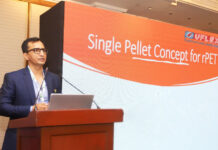India-based, global packaging company UFlex has commissioned a new BOPET film manufacturing plant in Nigeria, strengthening its presence in Africa. The company has a plant in Egypt and another in Dubai apart from its plants in Russia, Poland, Hungary, Mexico and the USA.
“Strengthening our leadership position in Africa, we have successfully commissioned our greenfield project in Nigeria that will house a first-of-its-kind 10.6-meter wide BOPET film line with a capacity of 45,000 TPA,” Ashok Chaturvedi, chairman and managing director, said.
Spread over 37 acres, the new plant also has two metallizers with a total production capacity of 15,000 TPA. The plant will supply packaging films to Nigeria, Western Africa and the US.
Drop in net profit in Q2FY2022
Meanwhile, the company has reported a drop of 23% year on year in net profit to Rs 170.7 crore in Q2 of FY2021-22. The company posted a consolidated operating profit or EBIDTA at Rs 424.5 crore for Q2 FY202-22 down by 10.2% year on year. The consolidated revenue registered a year on year growth of 36% at Rs 3036.2 crore for the quarter.
Owing to the global expansions made and contributions being made by the new lines that were commissioned in the past quarters, packaging films production witnessed a jump of 33.5% year on year to reach 124,670 MT in Q2 of FY2021-22 while packaging films sales witnessed an increase of 41.6% year on year to reach 122,321 MT. Overall sales volumes for the quarter was up by 31.5% year on year.
Speaking on the business’ financial performance, Rajesh Bhatia Group CFO, UFlex stated, “The demand for packaging films continues to be strong and is reflected in 41.6% sales volume surge in Q2 of FY2021-22 over Q2 of FY2020-21. All the newly commissioned plants in Hungary, Egypt, Russia and Poland are operating at near full capacity while the Nigeria plant is ramping up fast and will achieve full capacity utilization in the next one to two quarters.”
Bhatia added that the quarter witnessed heightened cost pressures with frequent increases in raw material prices, higher shipping and energy costs, and consequently a strong order book position only meant servicing these customers at increased input prices, thus affecting the margins. “However, given the strong demand momentum, once the raw material prices stabilize, the margins are expected to become better,” he said.











